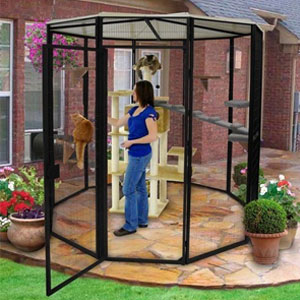Sometimes, cat owners may notice that their pet is behaving strangely and acting out due to stress. Your cat may refuse to come out of his outdoor cat enclosure. He may become timid or show signs of aggression. As a pet owner, you want to do the best you can to relieve the stress your pet is feeling. But before you do that, you need to understand how cats react to stress, and how to respond!

Click here to shop Suncatcher Enclosures
Why do cats get stressed?
There are a number of reasons for this. Each cat can handle various levels of stress. For one cat, new outdoor cat enclosures could cause him to feel insecure. If this is the case, help your pet understand that his new outdoor cat enclosure is safe. Plus, it has all the accessories your cat needs to feel happy and secure. For other cats, the arrival of a new baby or adding a kitten to their outdoor cat enclosure may trigger some stress.
When a cat gets stressed he may exhibit a number of behaviors including:
- Excessive chewing. If you notice that your pet is suddenly gnawing on all of his outdoor cat furniture, this could be a sign of stress. This is especially true if your pet has never destroyed his outdoor cat furniture in the past. Your cat may also chew up blankets, toys, and any other item he can get his teeth on.
- Aggression. When stressed, some cats will start to hiss, claw, and bite. If your cat behaves this way when you enter his outdoor cat enclosure, do not be alarmed. Aggression may be caused by a cat who is stressed by an illness or boredom. It is critical that you identify the cause immediately and take your cat to see a veterinarian.
- Indoor soiling. If you regularly let your pet out of his outdoor cat enclosure and into the house, he may start soiling if stressed. Do not scold your cat and get angry at him. Instead, cover the soiled spot with a towel or foil to discourage your pet from re-soiling the same area.
Keeping Your Pet Stress-Free in His Outdoor Cat Enclosure
Here are a few ways that you can decrease your cat’s stress and make its outdoor enclosure less intimidating:
- Provide your cat with his own space. Some cats are loners and do not like to share quarters with other animals. If this is the case, be sure your pet has its own outdoor cat enclosure so it can have plenty of privacy.
- Institute a consistent routine. Cats are creatures of habit and sometimes get stressed if their schedule gets thrown off. As a result, be sure to develop a consistent routine and stick with it. If you typically take your cat outside at 4 pm, try to be consistent with that schedule. Just like a cat waits by its food bowl around dinner time, cats may also wait by a door or patio, quietly requesting to go outside.
- Provide your pet with plenty of attention. Some cats need that extra dose of reassurance. They need to know you still love them, even if there is a new baby in the house or if you’ve adopted another kitten. Make a point to play with your cat in his outdoor cat enclosures every day for at least 10 minutes. This is a method of trial and error, as some cats aren’t as affectionate as others.
Shop our indoor and outdoor cat enclosures here. We offer both Suncatcher and Hybrid enclosures for your cats!






